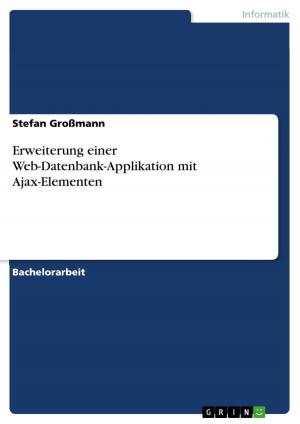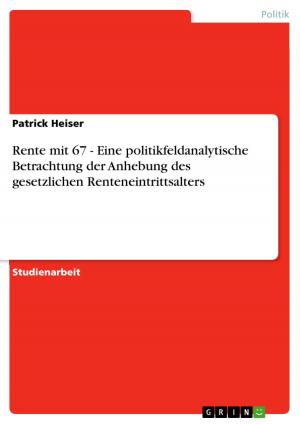Cockney. Its Characteristics and Its Influence on Present-Day English
Its Characteristics and Its Influence on Present-Day English
Nonfiction, Reference & Language, Study Aids, ESL, Foreign Languages| Author: | Sarah Rusch | ISBN: | 9783638561938 |
| Publisher: | GRIN Verlag | Publication: | October 28, 2006 |
| Imprint: | GRIN Verlag | Language: | English |
| Author: | Sarah Rusch |
| ISBN: | 9783638561938 |
| Publisher: | GRIN Verlag |
| Publication: | October 28, 2006 |
| Imprint: | GRIN Verlag |
| Language: | English |
Seminar paper from the year 2006 in the subject English - Pedagogy, Didactics, Literature Studies, grade: 1,0, Johannes Gutenberg University Mainz (Department of English and Linguistics), course: Introduction to English Linguistics, 10 entries in the bibliography, language: English, abstract: The Cockney dialect was long frowned upon by anyone who felt superior to this allegedly substandard, uneducated and vulgar manner of speaking. The Cockneys were considered stupid, poor and uneducated themselves. That was the prevailing attitude towards Cockney until very recently when the acceptance of the dialect and its speakers noticeably changed. What is a Cockney, though? A true Cockney has to have been born within the sound of the Bow Bells of St Mary-le-Bow Church in London's East End. The Cockney distinguishes himself by staying true to his origins deeply linked to the dialect. Cockney is one of the most remarkable dialects all over the Englishspeaking world. Back in 1938, though, William Matthews, author of 'Cockney - Past and Present',feared the decline of the dialect altogether because of the virtually non-existing acceptance in English society. Cockney was mainly a working-class accent, but was also aquired by criminals who enjoyed the population's incapability to understand the accent and dialect. The dialect was eventually made a scapegoat for the corruption of Standard English. A lot has changed since. When having a look at popular culture today, one might have the impression that the perception of the dialect has revolutionised. Cockney even seems to be on the rise again, being promoted by films like 'Lock, Stock' and 'Two Smoking Barrels', 'Snatch',and music by 'The Streets' for instance. In this paper, I want to examine in how far the recent obervations can be seen as a development of taking Cockney characteristics over into present-day English. By present-day English neither Received Pronunciation (RP) nor any other kind of Standard English (StE) is exclusively meant, but rather a broad definition of the English that can really be heard in England. Nonetheless, comparisons to RP and StE will be found because points of reference will be needed in the course of this paper. In the first part, Cockney will be contrasted to RP, for example, to illustrate its variation from the standard. The Cockney that forms the basis for the paper is the modern dialect. Like any other language it has undergone a great change since it was first recorded and to examine or only include several stages of its development would go beyond the scope of this paper.
Seminar paper from the year 2006 in the subject English - Pedagogy, Didactics, Literature Studies, grade: 1,0, Johannes Gutenberg University Mainz (Department of English and Linguistics), course: Introduction to English Linguistics, 10 entries in the bibliography, language: English, abstract: The Cockney dialect was long frowned upon by anyone who felt superior to this allegedly substandard, uneducated and vulgar manner of speaking. The Cockneys were considered stupid, poor and uneducated themselves. That was the prevailing attitude towards Cockney until very recently when the acceptance of the dialect and its speakers noticeably changed. What is a Cockney, though? A true Cockney has to have been born within the sound of the Bow Bells of St Mary-le-Bow Church in London's East End. The Cockney distinguishes himself by staying true to his origins deeply linked to the dialect. Cockney is one of the most remarkable dialects all over the Englishspeaking world. Back in 1938, though, William Matthews, author of 'Cockney - Past and Present',feared the decline of the dialect altogether because of the virtually non-existing acceptance in English society. Cockney was mainly a working-class accent, but was also aquired by criminals who enjoyed the population's incapability to understand the accent and dialect. The dialect was eventually made a scapegoat for the corruption of Standard English. A lot has changed since. When having a look at popular culture today, one might have the impression that the perception of the dialect has revolutionised. Cockney even seems to be on the rise again, being promoted by films like 'Lock, Stock' and 'Two Smoking Barrels', 'Snatch',and music by 'The Streets' for instance. In this paper, I want to examine in how far the recent obervations can be seen as a development of taking Cockney characteristics over into present-day English. By present-day English neither Received Pronunciation (RP) nor any other kind of Standard English (StE) is exclusively meant, but rather a broad definition of the English that can really be heard in England. Nonetheless, comparisons to RP and StE will be found because points of reference will be needed in the course of this paper. In the first part, Cockney will be contrasted to RP, for example, to illustrate its variation from the standard. The Cockney that forms the basis for the paper is the modern dialect. Like any other language it has undergone a great change since it was first recorded and to examine or only include several stages of its development would go beyond the scope of this paper.















